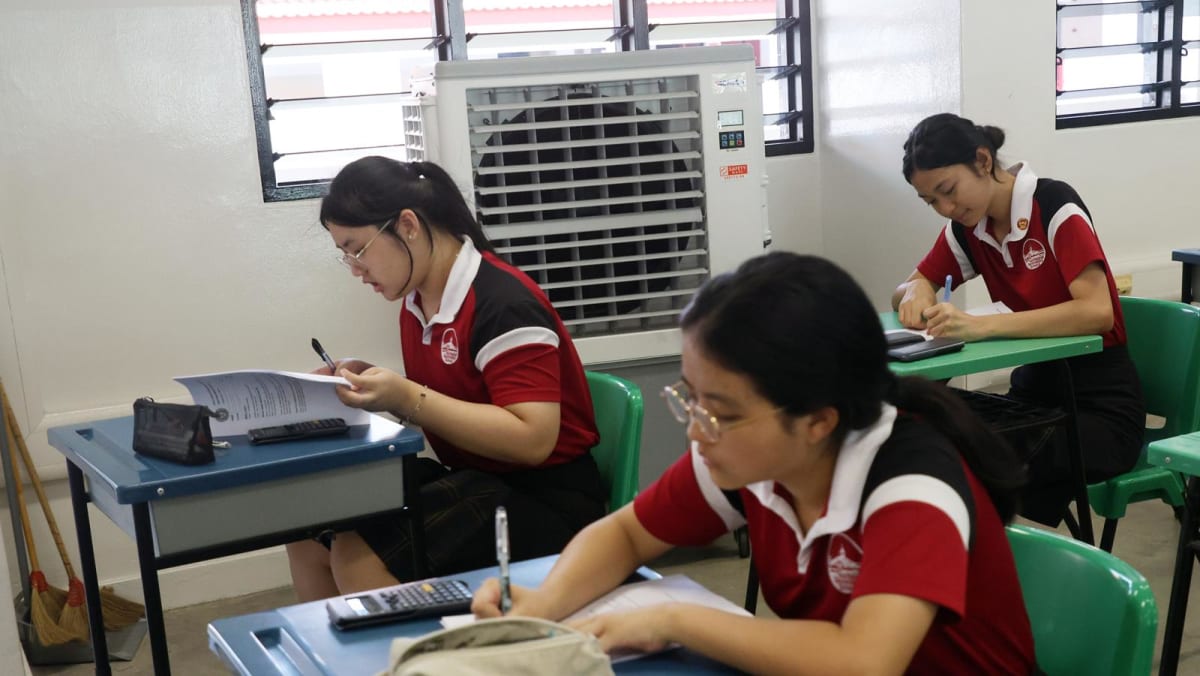With temperatures soaring during Singapore’s hottest months of May and June, 43-year-old Clement Tan is concerned about how the heat is affecting his children in school.
“Their school is in an older building and I’ve been there for meet-the-parents sessions. The fans do not provide ventilation throughout the whole classroom and it can be really uncomfortable at certain parts of the classroom,” Mr Tan, a litigation lawyer, said. He has three children aged 10, seven and five.
He has equipped his two older children, who study at Fairfield Methodist School (Primary), with handheld fans to give them some reprieve from the weather. The school has also allowed students to wear their physical education (PE) attire throughout the day, which has helped keep them cool and complaint-free.
However, since Mr Tan’s children have eczema – a condition that causes skin to become dry, itchy and bumpy and is exacerbated by heat – rising temperatures have caused flare-ups.
Several parents told CNA TODAY they were worried about how the stifling heat in school, during the commute as well as at home is affecting their children’s learning abilities.
These parents’ concerns are not unfounded. Some education and environmental experts said extreme heat conditions can affect students, with several studies showing that they scored lower grades and were unable to focus as temperature rises.
Singapore has experienced six historical heatwave events, with the most recent one in 2016. Heatwaves are when the highest daily temperature is at least 35°C for three consecutive days and the average temperature every day is at least 29°C.
In May 2023, the highest daily maximum temperature of 37°C was recorded, tying with that recorded in 1983.
May has always been one of Singapore’s hottest months. This year, from May 23 to 28, the highest daily temperatures ranged between 35°C and 36.2°C around the island.
With the effects of climate change, including rising average temperatures and heavier rainfall, experts predicted that more students would likely fall ill and miss school.
Calling for more air-conditioned classrooms may seem like the most obvious recourse, but the experts also said that turning on the air-conditioner too often could affect the body’s heat tolerance and ability to handle rising temperatures in the longer term.
In preparation for future rising temperatures, the Mercury Taskforce was set up in 2023 to create a national heatwave response plan. It is led by the Ministry of Sustainability and the Environment as well as the National Environment Agency.
Should a heatwave occur, students will be allowed to wear dress-down attire such as uniforms made of dry-fit material. Outdoor activities will also be minimised between 11am and 4pm, or suspended if heat stress levels spike, the taskforce proposed.
And should there be a need for heightened measures, schools may switch to either partial or full home-based learning.
The Ministry of Education (MOE) said that it refers to studies here and overseas with regards to thermal comfort and that schools have guidelines from the ministry as well as the autonomy to determine what sort of measures would help students to manage the heat.
Besides adopting the heatwave response plan by the task force, of which MOE is also a member, it has also taken measures to improve the ventilation of classrooms.
“New schools are also designed to facilitate natural cross-ventilation through the use of computer simulations on air flow and wind velocity,” it added.
“MOE is also progressively adopting additional measures to enhance thermal comfort in classrooms, such as adding more fans and changing them to energy-efficient direct current models, and painting school building exteriors with cool paint.”
STUDENTS ARE GRUMPIER, MORE IRRITABLE
Despite these moves, Ms Rynette Joyce Tan’s children have been “more cranky than usual” as the highest daily temperatures hit 36.2°C in the later half of May.
“They complain as they get itchy and irritable from feeling too warm. They get agitated more easily and tend not to speak too nicely to each other,” she said.
The founder of childbirth education platform 13Thirteen is the mother to four children aged 11, 10, seven and five.
“Our kids usually take the public bus to school on their own but lately, they’ve been asking us to pick them up more often,” Ms Tan added.
“Sometimes, they’ll even catch a ride with a friend’s parent if they can. I think they’re drained from the heat by the end of the school day.”
Her children’s school has switched the material used for its school uniform to a lighter, moisture-wicking fabric. This has helped make the heat more bearable, Ms Tan said.
At home, the family has made provisions to keep the children cool.
“We don’t usually use the air-conditioner during the day but with this heat, we’ve told the kids it’s okay to switch it on, especially when they’re studying for exams and need to concentrate.”














